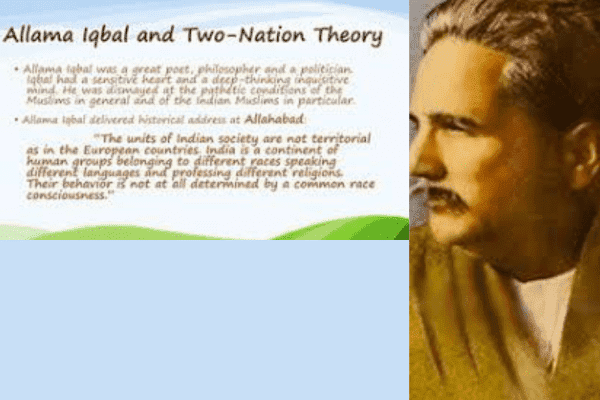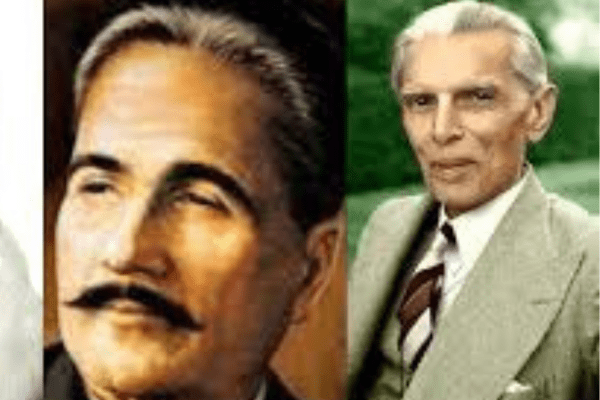
Allama Iqbaleminent philosopher, poet, and politician Allama Iqbal is well known for having had a significant impact on the political and intellectual climate of the Indian subcontinent in the early 20th century.Allama Iqbal Pakistan’s formation was made possible by his Two-Nation Theory, one of his most important contributions to South Asian political philosophy. According to this theory, Muslims and Hindus in British India were two different countries with unique national identities and religious and cultural practices that called for the creation of separate states.

The Intellectual Roots of the Two-Nation Theory

Allama Iqbal comprehension of Islamic concepts and his exposure to Western philosophy had a profound impact on his intellectual development. Iqbal, who had his training in Europe, combined Western philosophical concepts with Islamic principles to provide a distinctive viewpoint on the political and social problems that Muslims in India face. His works and poetry demonstrate his conviction that Muslims require a unique political identity in order to protect their cultural and religious values in a multicultural and frequently divisive society.
Iqbal’s observations of the sociopolitical conditions in British India led to the development of the Two-Nation Theory, which was not sudden nor isolated. Iqbal believed that there was a fundamental difference between Muslims and Hindus despite the fact that the Indian subcontinent was a complex tapestry of languages, ethnicities, and religions. The development of this thesis was largely influenced by his thoughts on Islamic revivalism and his worries about the place of Muslims in a society that is predominately Hindu.

The Two-Nation Theory: Concept and Significance

The fundamental idea of the Two-Nation Theory was that Muslims and Hindus belonged to different nations because of their unique social, cultural, and religious identities. Iqbal maintained that these divisions were too great to be made whole by a single political system. In his view, Muslims needed their own state in order to protect their political and social rights, maintain their cultural traditions, and freely practice their faith.

The clearest expression of Iqbal’s vision came from his 1930 presidential speech to the All-India Muslim League, in which he presented his idea for an autonomous Muslim state in northwest India. He underlined that having their own country will safeguard Muslims’ religious and cultural identity while also giving them a chance to advance sociopolitically. The desire for a distinct country that would one day become Pakistan served as more concrete evidence of this ambition.
Allama Iqbal’s Role in Shaping the Two-Nation Theory
Iqbal’s Influence on the Political Movement
Although Iqbal was a prominent supporter of the Two-Nation Theory, Muhammad Ali Jinnah, the head of the All-India Muslim League, was mostly responsible for the ideas’ widespread adoption. Jinnah, who at first supported Hindu-Muslim unity, eventually came to share Iqbal’s vision when he realized how Muslims were becoming more and more marginalized in society and politics as a result of British colonial authority and the Indian National Congress.
The argument for a distinct Muslim state was supported intellectually by Iqbal’s political and philosophical contributions. His poetry, which focused on themes of spiritual renewal, self-discovery, and unification, encouraged and inspired Muslims to imagine a different kind of politics. Many Muslims who felt excluded in a country where Hindus made up the majority found solace in his focus on Islamic principles and the necessity of having a unique national identity.
The Legacy of the Two-Nation Theory
In the end, the Two-Nation Theory was crucial to Pakistan’s establishment in 1947. The theory formed a pillar of Pakistan’s intellectual base after first providing a framework for comprehending Muslim political goals. After Iqbal’s dream of an independent Muslim state came true, Pakistan became a state dedicated to upholding Islamic principles and giving Muslims living on the subcontinent a place to call home.
Iqbal has made contributions outside of political philosophy. Generations have been inspired by and influenced by his poetry, which reflects his unwavering dedication to the principles of justice, harmony, and intellectual awakening. His influence is profoundly embedded in Pakistan’s political and cultural character, and his idea of a separate Muslim state is still up for discussion and thought.
Conclusion
The revolutionary Two-Nation Theory of Allama Iqbal changed the political climate on the Indian subcontinent. The idea presented a vision for a distinct Muslim state that catered to the unique needs and ambitions of Muslims in British India, and it was based on his philosophical and religious insights. In addition to helping Pakistan come into existence, Iqbal’s political and intellectual achievements had a long-lasting influence on the conversation about political philosophy and national identity. His legacy is still an inspiration and a topic of great importance in today’s debates about statehood and identity.
